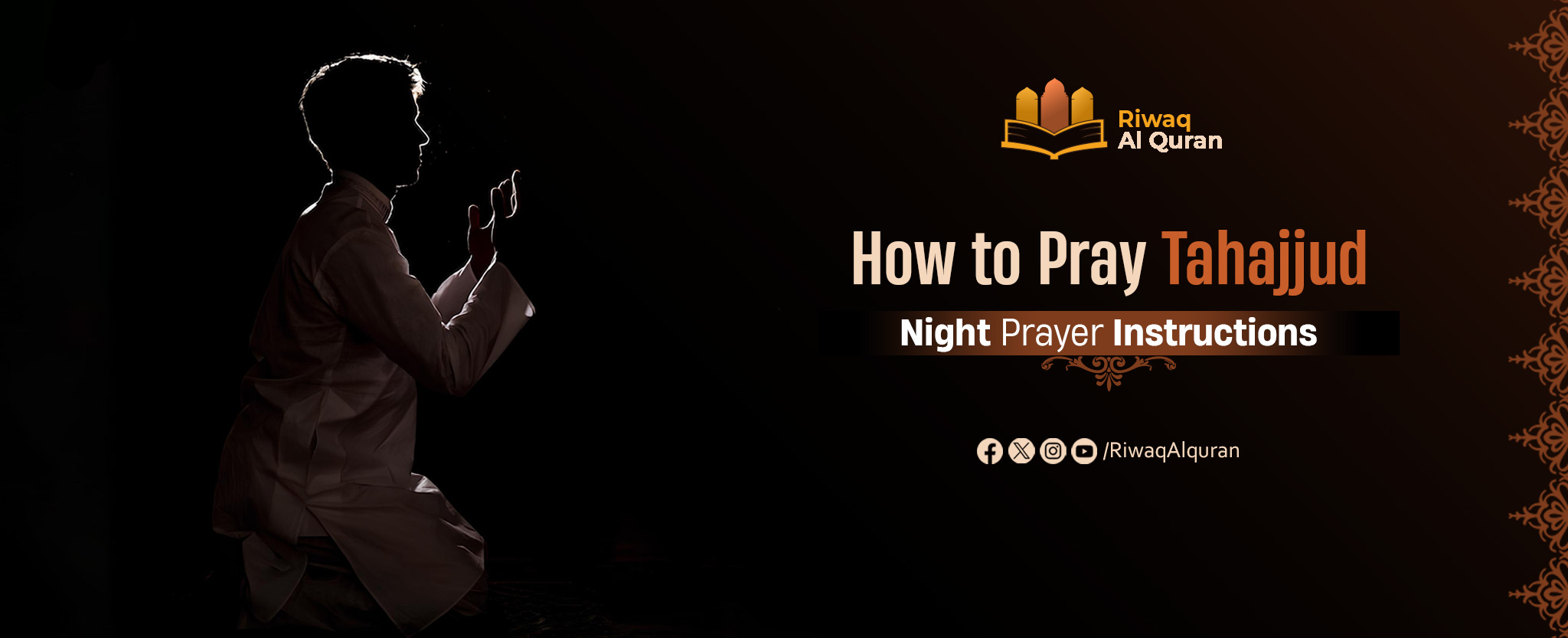Tahajjud is performed after midnight in pairs of rakats (units of prayer). Start by setting an intention (niyyah), performing ablution (wudu), and creating a peaceful prayer space. Recite Surah Al-Fatihah and Quranic verses in each rakat, followed by bowing (ruku), standing, and prostration (sujood). Complete with Tashahhud and Tasleem.
You can pray a minimum of two rakats, with optional additional rakats, ending with Witr before Fajr. This prayer deepens your spiritual connection with Allah and is an ideal time for heartfelt dua.
The Tahajjud prayer is a well-known sunnah within the Muslim community, especially during the holy month of Ramadan. However, it is less common for Muslims to consistently perform the Tahajjud prayer on other days of the year.
Allah said in His Holy Quran:
“And rise at the last part of the night, offering additional prayers, so your Lord may raise you to a station of praise.”
This is a direct sign to highlight the virtue and reward of the Tahajjud prayer.
Additionally, some Muslims confuse the Tahajjud and Qiyam al-Layl prayer.
To address this, we have created this educational article to guide you on the purpose of Tahajjud, how to perform the night prayer, its benefits, and the types of dua you should recite during this special prayer. Keep reading to unlock a new form of worship for yourself!
Table of Contents
What Is Tahajjud Prayer?
One type of salah in Islam is the Tahajjud prayer, a voluntary (nafl) prayer performed in the last part of the night. It is offered to obtain forgiveness from Allah and is considered as a key opportunity for repentance.
While it is not mandatory, many faithful Muslims make it an obligation to perform the Tahajjud prayer every day as a kind of prayer to ask Allah for mercy and salvation.
In addition, Tahajjud meaning in Islam is the rise from sleep during the night, which can also be called “keep vigil”.
How Many Rakats In Tahajjud?
The Tahajjud prayer doesn’t have a fixed number of rakats, as you can pray from 2 rakats (the minimum number) up to 13 rakats including the Witr as the prophet (peace and blessings be upon him) did.
When To Perform Tahajjud Prayer?
Tahajjud prayer time could be any part of the night after Isha prayer, but in other opinions, it begins after the first half of the night. However, the best time to pray Tahajjud is the last third of the night.
This is because of what Allah’s Messenger said: In the last third of every night our God descends to the lowest heaven and says: Who is calling Me, so that I may answer him? Who is asking Me, so that I may grant him? Who is seeking forgiveness from Me, so that I may forgive him.
To determine the last third of the night, divide the time between Isha and Fajr into three parts and choose the final part.


Tahajjud prayer is performed by repeating pairs of rakats (units of salah), which includes the following steps:
1. Set An Alarm On Tahajjud Time
Set an alarm to wake up after midnight or in the last third of the night. If you accidentally couldn’t wake up or fall asleep during the middle of Tahajjud prayer, don’t get upset or blame yourself.
2. Get Ready For Tahajjud Prayer
Preparing yourself for Tahajjud prayer is the essential key to maintaining this significant act of worship and building a cherished routine for you. Here are some necessary steps that, once mastered, will help you to achieve the consistency and sincerity toward this special prayer:
Make Your Intention (Niyyat)
Setting up your niyat (intention) for Tahajjud is an important step to do before performing the Tahajjud prayer, as it helps you remain committed to your intended number of rakats.
For Tahajjud intention, quiet your mind and disregard any negative or distracting thoughts or feelings. Close your eyes and try to get the highest level of spiritual awareness and a sense of closeness to Allah, and clear your heart of all worldly concerns.
Do Wudu (Ablution)
Once you wake up, set your intention, then perform Wudu. Wash your face, wash your arms and hands up to and including the elbows, wipe your head (Masah), and finally wash your feet up to the ankles.
Wudu is a fundamental ritual in Islam. Whether it’s your first time performing wudu or you want to confirm your usual steps, refer to the guide below to learn all about the process:
Wudu Steps: How To Perform Wudu?
Arrange A Suitable Prayer Space
Encourage yourself and find a clean and quiet place to pray where you won’t be disturbed.
Don’t hesitate to indulge yourself with the spiritual vibes by adding gentle lighting to the room, putting your Mus’haf (The Holy Quran) nearby, and laying out your favorite prayer rug.
3. Stand upright And Face Qibla
Your Tahajjud prayer place is ready now to welcome anyone who likes to go ahead with salah!
Take over the standing position on the prayer rug, face Mecca’s direction, renew your intention, raise your hands to your earlobes, and say “Allahu Akbar”.
4. The First Raka’h In Tahajjud Prayer
After Takbeers, fold your hands over your chest, placing your right hand over your left, and then follow the below steps:
Recite Surah Al-Fatihah And Another Portion Of Quran
Start the first raka’h of Tahajjud prayer with these recitations not out loud or silently, but in between applying to the Sunnah as the prophet said to Abu Bakr to raise his voice instead of reading silently.
Perform Ruku (Bowing)
Say “Allahu Akbar” while you’re raising your hands to your ears, then bow at the waist, put your hands on your knees, and chant ruku’s dua three times silently, which is “Subhana Rabbiyal Azeem” (Glory to my Lord, the Most Great)“.
Stand Upright After Bowing
By finishing ruku’s dua, move to the I’tidal position while raising your hand and repeating “Sami Allahu liman hamidah”, then in a lower voice say “Rabbana Wa Lakal Hamd.”
Do First Sujood (Prostration)
Move into the prostration position by saying “Allahu Akbar”. Kneel your body, and touch the ground by your forehead, nose, and hands. Then recite the Sujood dua, which is “Subhana Rabbiyal A’la” (Glory to my Lord, the Most High).
Sit up in the Jalsa position between the two sujoods, and silently say “Rabbighfirli” (Oh Allah, forgive me) three times.
Turn Back To Second Sujood
After reciting Jalsa dua, transition to the second sujood while chanting “Allahu Akbar” and repeat all that you have done in the first prostration.
5. The Second Raka’h In Tahajjud Prayer
For the second rak’ah, straighten up and follow exactly the same acts as for the first raka’h. For more explaining, observe the steps listed below:
Heading To Qiyam (Standing Position)
After rising from the Jalsa position and rearranging your posture, go over the takbeer words “Allahu Akbar”. Remember to recite the surah al Fatiha along with another passage from the Quran.
Repeat the other steps (from Ruku to Sujood) as we explained in the first rakah.
Spell Out ُThe Final Tashahhud
Once standing from the second sujud of the first rakah, lift your index finger straight, point it forward, and recite the last Tashahhud:
“At-tahiyyatu Lillahi wa-salawatu wa’t-tayyibat, as-salamu ‘alayka ayyuhan-Nabiyyu wa rahmat-Allahi wa barakatuh. As-salamu ‘alayna wa ‘ala ‘ibad-Illah is-saliheen. ashhadu alla ilaha illallah wa ashhadu anna muhammadan ‘abduhu wa rasuluhu.
Allahumma salli ala Muhammadiw wa ala aali Muhammadin, kama sallayta ala Ibraheema wa alaa aali Ibraheema, innaKa Hameedum Majeed. Allahumma baarik ‘ala Muhammadiw wa alaa aali Muhammadin, kamaa baarakta ala Ibraheema wa alaa aali Ibraheema, innaKa Hameedum Majeed.”
Complete With The Tasleem
Put your index finger back against your knees, and repeat “Assalamu alaikum wa rahmatullah” as you rotate your head to the right and then left to conclude the Tahajjud prayer.
6. Optional Additional Rakats
Tahajjud prayer is always performed in pairs. You can execute more rakats in pairs. However two rakats are typically considered to be the minimum for Tahajjud, you are permitted to pray more.
Hadiths state that the Prophet Muhammad (peace be upon him) frequently prayed up to thirteen rakats, including Witr.
Eight rakats is considered an appropriate number by many Muslims. It is typical for people to pray two, four, six, eight, or twelve rakats; however, more prayer is advised as it provides greater rewards.
Finally, it is strongly encouraged to recite long surahs like Al-Baqarah, An-Nisā’, or Al-‘Imran in the Tahajjud prayer rakats.
Experience Riwaq Al Quran Classes
Watch real moments from our live sessions at Riwaq Al Quran and see how we bring learning to life. These clips highlight our interactive, student-focused approach designed to keep learners engaged, motivated, and actively involved in every step of their educational journey.
How To Pray Tahajjud And Witr?
In the customs of Prophet Muhammad (peace be upon him), if you are doing Tahajjud and dawn is coming, you can finish with one rakat as Witr, an optional pre-dawn prayer offered before the obligatory Fajr prayer.
Tahajjud Prayer Dua
The Tahajjud dua is one of the most significant goals and motivation for Muslims, encouraging them to perform and persevere in it. This is due to the highly esteemed time of Tahajjud prayer in Islam and the great rewards associated with it.
In the following points, you will find some of the Tahajjud prayer quotes that you can use during your prayer:
O Allah, to You, is all praise. You are the enforcer of the heavens and the earth and all that is in them. Praise be to You. You are the King of the heavens and the earth. Glory be to You, the radiant light of Heaven and earth.
Praise be to You, You are true, Your promise is true, Your meeting is true, Your word is real, Heaven is real, Hell is real, the prophets are true, Prophet Muhammad SAW is real, and the Day of Judgment is real.
O Allah, to You I surrender, to You, I return, to You I miss, and to You I judge. Forgive me for my mistakes and the previous ones, both what I have hidden and what I have stated.
You are the first God and the last God. There is no God but You. There is no power and strength except with (the power of) Allah.
Tahajjud Dua For Success
Tahajjud is a special time for personal supplication, you can ask Allah for success in any lawful striving. Here are a general dua you can use:
“O Allah, I ask You for forgiveness and well-being in this world and the Hereafter. O Allah, I ask You for success and prosperity in all matters, and that You grant me goodness and blessings in my life.”
Tahajjud Dua For Marriage
Islam considers marriage as a holy bond, and Tahajjud prayer holds profound significance for those seeking righteous wives and finding compatible partners. Here’s some examples of Tahajjud dua for marriage that you can use:
- O Allah, make my marriage blessed and grant me happiness, stability, love, and mercy in it.
- O Allah, decree for me to marry the one who is best for me in my religion, my worldly affairs, and my Hereafter.
Also, you can chant some Ayat from the Quran that convey the same meaning:
1. “Rabbana hablana min azwajina wa dhurriyatina qurrata ‘ayunin waj’alna lil-muttaqina imama.”
Wich means:
“Our Lord, grant us from among our wives and offspring comfort to our eyes and make us an example for the righteous.”
2. “Rabbi la tazarni fardan wa anta khayrul-waritheen.”
Which means:
“My Lord, do not leave me alone [with no heir], while You are the best of inheritors.”
Tahajjud Prayer Benefits
The time of Tahajjud prayer, when Allah descends to the lowest heaven, which makes him closer to us, it’s a cherished moment for any Muslim to make extended and heartfelt dua.
The following points convey the Tahajjud benefits and what’s behind the consistency of this special worship:
1. Deepened Spiritual Connection with Allah
This prayer enhances the believer’s connection with Allah, by the solitude of the night that allows you to have undistracted worship.
2. Spiritual Growth and Development
This is one of the benefits of Tahajjud prayer, as the regular performing and building such a worship like this with the god, definitely will strengthen your willpower and perseverance.
This is back to the contributed discipline which makes it effect on your growth, faith, and dedication.
3. Daily Opportunity For Repentance
Tahajjud prayer time is the perfect one for seeking forgiveness for your mistakes (however big or small) and sins, as is mentioned in numerous hadith.
This prayer also offers a sacred space for self-reflection and repentance, where believers can ask for guidance on the righteous path.
4. Inner Peace and Serenity
The nature of Tahajjud prayer provides a time to de-stress, reflect, and find solace in faith, promoting overall emotional well-being.
5. Fulfillment of Needs and Desires:
The tranquility of the night creates an ideal environment for making sincere and heartfelt requests to Allah, seeking His assistance in fulfilling personal needs and desires.
In addition, numerous hadith emphasize the importance of Tahajjud prayer, highlighting its role in seeking Allah’s mercy, forgiveness, and guidance. For instance, the Prophet Muhammad (peace be upon him) mentioned,
“The best prayer after the obligatory prayers is the night prayer”.
Can I Pray Tahajjud Without Sleeping?
This is a popular inquiry besides the question about sleeping is important for Tahajjud? What comes next should be a sufficient response.
You can perform Tahajjud salah whether you sleep or not. Sleeping is not a requirement for Tahajjud validation, it’s only recommended to be more focused during the prayer time after midnight and to avoid exhausting your body.
Is Tahajjud Prayer Always Accepted?
There’s no guarantee that all duas made during Tahajjud prayer will be accepted, as acceptance depends on Allah’s will and wisdom.
Feel thankful that you are looking to Allah for support and direction in both your spiritual and material concerns. But it’s also critical to keep in mind that Allah’s plans might differ from our desires or expectations, so Tahajjud dua could not be answered.
Also, it is essential to have faith in Allah’s wisdom and trust that he will provide for all of your needs.


Why Students Love Learning with Riwaq Al Quran
Hear directly from our students about how Riwaq Al Quran Academy has transformed their connection with the Book of Allah. Their experiences reflect the dedication, care, and quality that guide every step of our teaching.
Learn Quran, Arabic, And Islamic Studies Online With The Best Native Tutors
Riwaq Al Quran is a comprehensive online platform that offers personalized Quran, Arabic and Islamic Studies Online classes for individuals of all ages and backgrounds.
Their experienced instructors use a structured curriculum to cover Tajweed, Tafsir, and Memorization, providing easy and effective access to learning the Quran.
The advanced online classes allow for seamless communication and interaction between students and teachers. Join Riwaq Al Quran for a deeper connection with the Quran.
We offer several courses such as:
- Online courses for kids.
- Online Quran classes for kids and adults.
- Online Arabic courses
- Online Ijazah courses
- Online Islamic Studies courses.
Here are a sample of our set of Quran Courses that will be helpful for you:
- Online Tafseer Course: Delve into Quranic meanings with our insightful online Tafseer course.
- Noorani Qaida Online: Learn Quranic basics efficiently through our Noorani Qaida online program.
- Online Quran Recitation Course: Enhance Quranic recitation skills through our expert-led online course.
- Online Tajweed Classes: Master Tajweed rules for beautiful Quranic recitation in online classes.
- Quran Memorization Online Course: Memorize the Quran effectively with our specialized online memorization course.
- Online Qirat Course: Explore diverse Qirat styles with our comprehensive online Qirat course.
- Online Quran Classes for Kids: Nurture a love for the Quran in kids through interactive online classes.
Conclusion
The Tahajjud prayer is a voluntary night prayer performed in the last part of the night. It is a highly regarded act of worship in Islam, offering an opportunity for repentance and seeking forgiveness from Allah.
While there is no fixed number of rakats, it can range from 2 to 13. The best time to pray Tahajjud is the last third of the night. The prayer involves setting an intention, performing ablution, finding a quiet place, and following the steps of Salah. It concludes with Tasleem, and additional rakats can be added.
Tahajjud offers spiritual growth, repentance, inner peace, and fulfillment of personal needs.
Duas made during Tahajjud hold special significance, but their acceptance depends on Allah’s will. It is recommended to approach this prayer with sincerity and dedication, recognizing it as a gift from Allah.
Finally, recognize that Allah has ordered the Tahajjud prayer for the benefit of Muslims, He does not require you to perform it. It is a gift, therefore everyone ought to accept and appreciate it.
To conclude this guide, always aim to be from these faithful Muslims they mentioned in the following Ayat
“who spend the night prostrating themselves before their Lord and standing” Sadaqa Allahu al-Adheem.


































